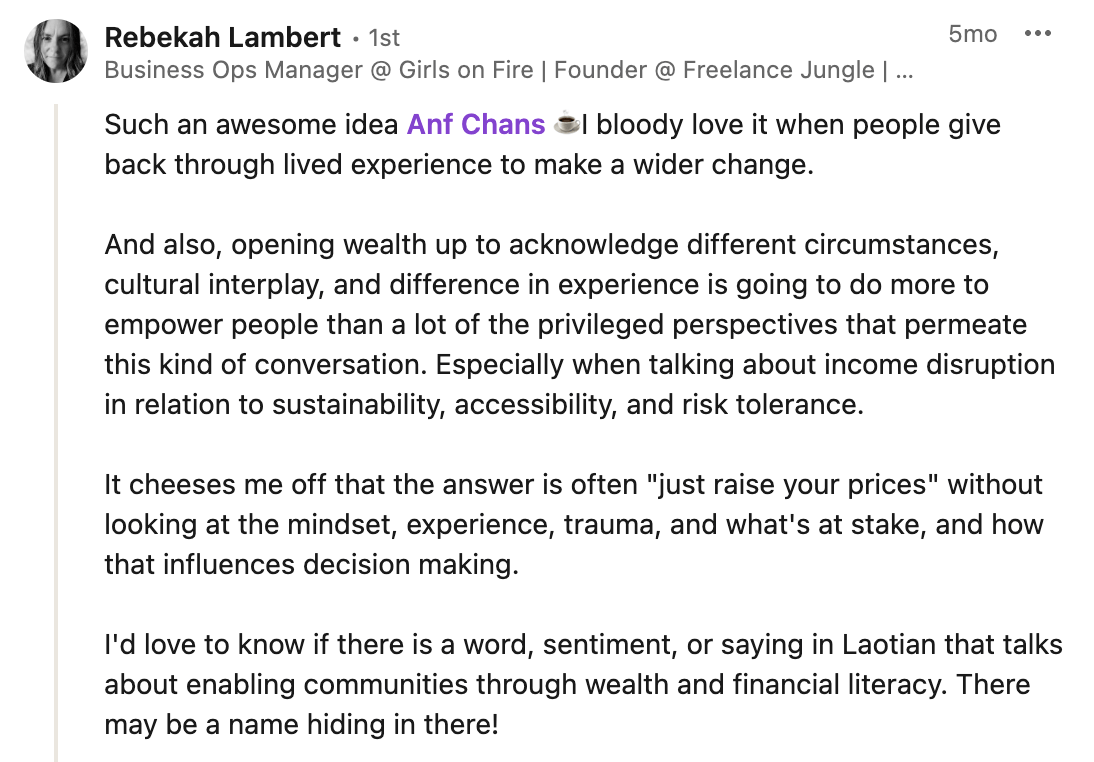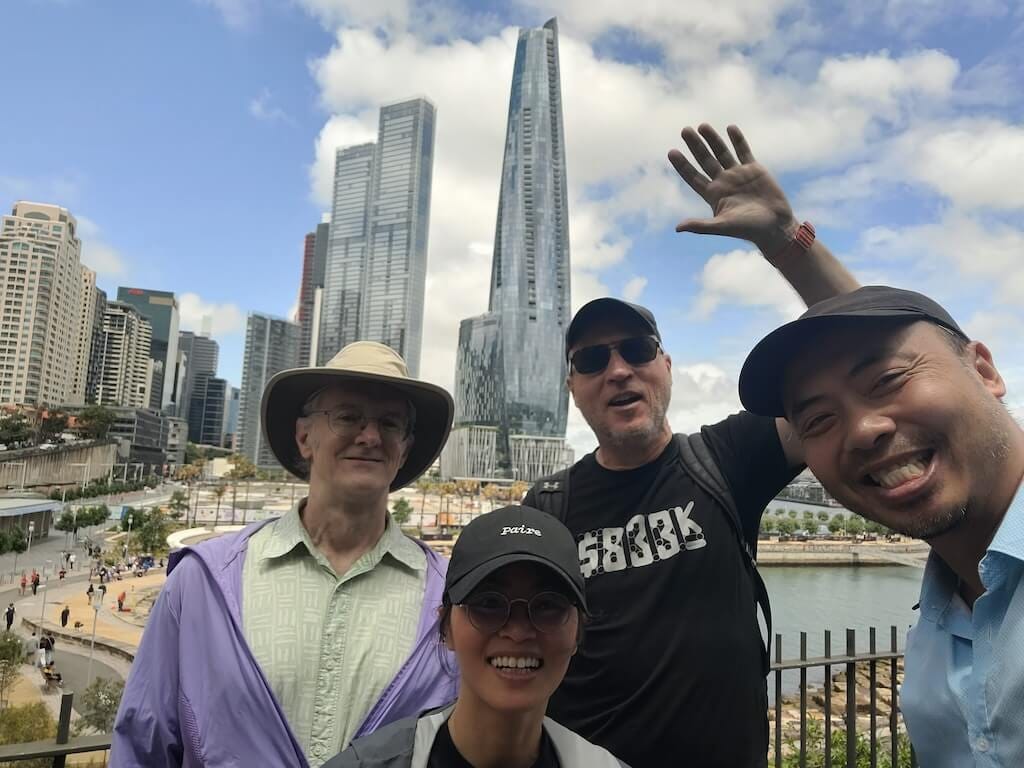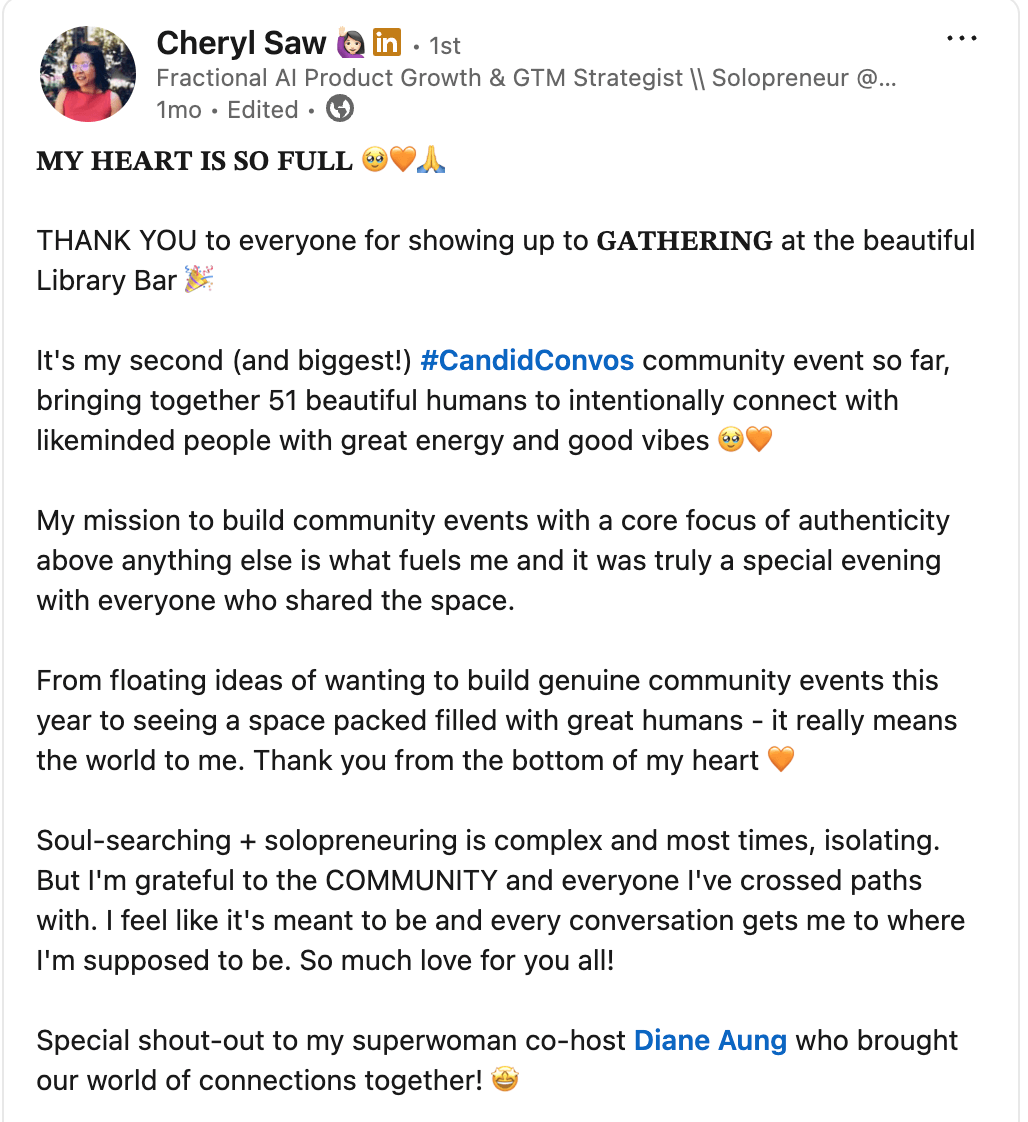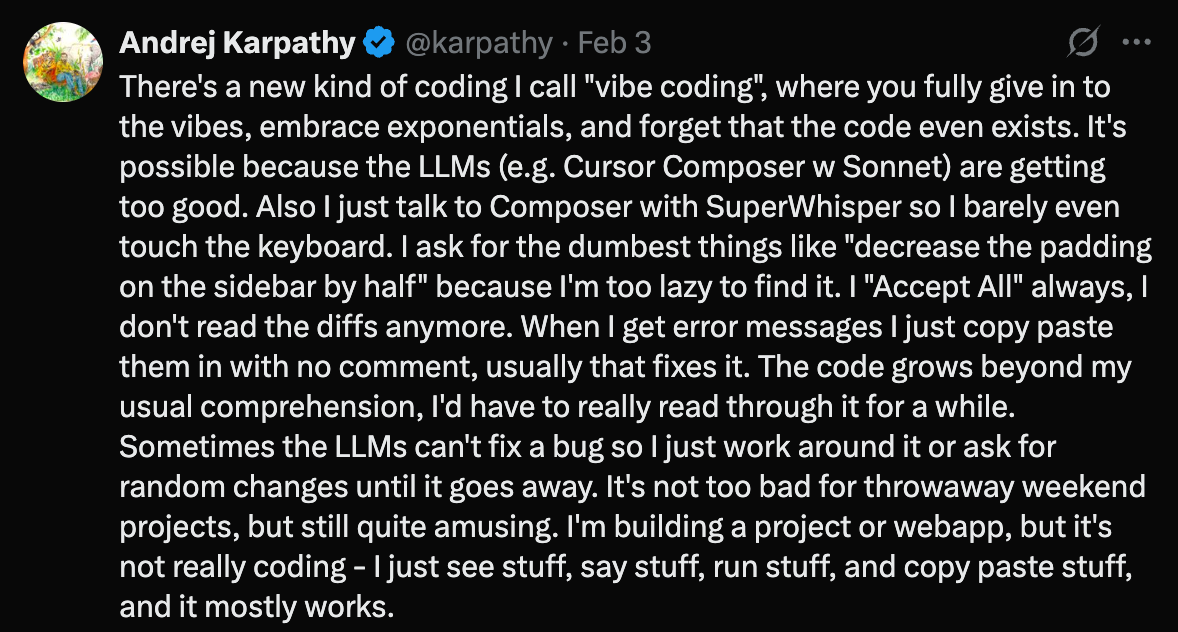10 Skills That Quietly Make You Stand Out (And Most People Skip)
Discover the underrated skills that make you visible, trusted, and remembered—in work, life, and leadership.
👋 Hey, I’m Anf. Welcome to my (sometimes) weekly newsletter, where I share practical strategies and insights to help you create better content, attract the right audience, and build a sustainable business.
🛠️ Need help building a content engine for your business? Let’s talk.
📩 New here? Subscribe to get future posts.
What does it really take to stand out—and why do so many smart, capable people still get overlooked?
Today, I share my journey (and observations) around what actually gets people noticed—not louder voices or shinier resumes, but a different set of quiet skills that build visibility, trust, and traction over time.
If you’ve ever felt invisible despite doing great work, you’ll walk away with:
A clearer understanding of the real skills that lead to recognition and invitations
Stories and insights from creatives, founders, and leaders who made themselves inviteable
Practical steps you can try right now to get seen—without shouting or pretending to be someone you’re not
Grab a tea, take a breath, and let’s explore how to get recognised for the work (and person) you already are.
Read time: 5 minutes
This newsletter was drafted with the help of ChatGPT, then refined and human-edited by yours truly before publishing.
📌 Present: Where I Am Now
Over the past few years, I’ve had a front-row seat to brilliant people doing excellent work… and still getting overlooked.
They’re not missing talent. They’re missing visibility, clarity, and the right kind of traction.
I’ve been that person too—quietly putting in the work, hoping someone would notice.
It wasn’t until I started building these 10 skills that things began to shift.
Now, I feel clearer, more confident, and far less dependent on luck or validation. These skills didn’t make me louder. They helped me become undeniably useful—and easier to remember.
This list is for anyone who wants to be seen and trusted—without shouting or pretending.
💡 Perspective: Lessons from My Journey
What gets rewarded isn’t always what gets taught.
We’re told to “do good work,” but not how to communicate it, document it, or translate it into value others can actually recognise.
Visibility felt awkward. Self-promotion felt fake. So I stayed small.
There’s a very specific kind of frustration that comes from watching someone with less experience get the opportunity you were quietly hoping for.
And the worst part? You don’t even blame them. You just wish you’d spoken up sooner.
Once I stopped waiting to be picked and started experimenting with these 10 practices, things began to change.
Not overnight. But steadily—and with more ease than I expected.
🚀 Progress: What I’ve Learned by Doing (and Watching Others Do)
Here’s what I’ve tried, observed, and collected from people who now get noticed for the right reasons:
1. Share your work in public
Mindset: Visibility is not arrogance—it’s leadership.
The more I posted online (even casually), the more people connected the dots between what I do and what I know.
Five months ago, I posted a video on my LinkedIn announcing a project that I’d been quietly brewing for some time. Sharing something I was working on sparked supportive comments like this one from Rebekah Lambert :
Incidentally, this project has since been given a name - Migrant Wealth Builders.
I’ve seen founders attract investors, and creators land collaborations just by showing up and sharing the process—even the messy parts.
Note: If you’re a founder wondering if building in public is the way to go, have a listen to this episode of The Panel podcast where they explore, “Should you still build in public?”. I particularly resonate with the sentiment shared that “build in public” has become “brag in public”, and they suggest better ways to approach it if you don’t want to come across as one of those braggers.
Consequence of ignoring this skill: You’ll be a well-kept secret—and not in a good way.
Here are some great examples of engaging share-in-public posts:
2. Communicate with clarity and confidence
Mindset: If I can’t explain it simply, I probably don’t understand it deeply.
The people who get remembered are the ones who explain complex ideas in plain language.
I used to overtalk to sound smart—now I default to simple and specific. Simple language builds trust faster—because people feel like you’re not hiding behind jargon.
But it’s not just about what you say—it’s about what you’re willing not to say “yes” to.
Michelle J Raymond shared:
“Being a yes person I think helps people get promoted faster. I never quite got the hang of that skill.”
It’s a common belief that saying yes leads to opportunity. And sometimes it does.
But I’ve also seen people earn deep respect by setting boundaries and speaking up when something doesn’t align.
Clear communication builds real leadership, not just likability.
Consequence of ignoring this skill: People won’t follow your thinking—or trust your judgment.
3. Learn to speak in dollars, not just ideas
Mindset: If I want people to invest in what I do, I need to show them the upside.
I’ve seen talented marketers lose executive buy-in because they focused on "reach" when the room was more interested in "revenue."
Purna Virji once bombed a CFO presentation pitching “brand awareness.” The CFO asked one question:
“What’s the payback period?”
She later said:
“CFOs don’t hate spending money. They hate uncertain outcomes.”
Learning to speak their language was the best move she ever made.
Consequence of ignoring this skill: You’ll sound smart, but still get told “no.”
4. Document your wins and your IP
Mindset: If I don’t write it down, it didn’t happen.
I’ve lost track of my own wins before. I’ve also watched people get sidelined while others took credit for their work.
Kerry Milne put it bluntly:
“I never said what I was good at. Never asked for reviews. Totally set myself back years.”
Joanna Bloor adds:
“The future is shaped in conversations you don’t hear—until someone brings your name into the room.”
Consequence of ignoring this skill: Your impact gets forgotten, downplayed, or erased.
Here are three solid examples of documenting wins publicly:
5. Grow a diverse network
Mindset: The best ideas come from outside the echo chamber.
I started Founders Walks as a way to connect with other builders—and to get out of my chair.
The first one? Just two founders, one VC, and me walking and chatting as we explored Barangaroo together here in Sydney. And the feedback was terrific:
“Such a vibe. Low-stakes, smart people, great conversations.” — String Nguyen
“Perfect environment to practice networking while fundraising.” — David Wilson
And it never once felt like “networking.”
Cheryl Saw’s CandidConvos gathering does something similar - her last event brought 51 people into a room to connect around authenticity and good energy.
Consequence of ignoring this skill: You’ll keep solving small problems with small perspectives.
6. Learn to build things (even without code)
Mindset: I don’t need permission. I need prototypes.
Naval Ravikant puts it best:
“Learn to sell. Learn to build. If you can do both, you will be unstoppable.”
Here’s the thing—we’re now in a time where builders are more highly valued than ever.
Why? Because we finally have tools that lower the barrier to actually making something—fast.
AI, no-code platforms, and productised services mean you don’t have to wait for a developer, raise capital, or build an agency to test an idea. In 2025, you can “vibe code” and ship a prototype in 20 minutes with a single prompt using tools like Loveable and Replit. (I know because I’ve been testing these)
(Source: @kaparthy / X)
Tim Griffiths has also been playing with these vibe coding tools, and he put it this way:
”They're not just toys. They're transforming how fast you can prototype. It’s a great way to validate ideas internally without blowing your budget on development time.”
This shift rewards people who move from "I have an idea" to "Here's a working version"—without needing a full team behind them.
Whether you're inside a company or building something of your own, being able to build and test quickly makes you the person who creates momentum (not just talks about it).
Consequence of ignoring this skill: You’ll stay in theory while others are shipping.
7. Master self-leadership
Mindset: If I want others to trust me, I need to trust myself first.
Self-leadership isn’t just about setting goals. It’s about owning the direction you're heading—even if it’s still unfolding.
Joanna Bloor shared how she missed a leadership opportunity. Not because she lacked experience. But because she hadn’t shown where she wanted to go.
“When a new CEO joined, I focused on the team’s wins and forgot to share where I wanted to go next. He assumed I didn’t have a next.”
She later reflected:
“I hadn’t shared a vision—because I didn’t really have one.”
That’s the pivot point. She realised she hadn’t trusted herself enough to claim a direction—so no one else could see one either.
And that clarity? It changed everything. Within six months, she was invited to speak at TED. Because she began to reveal the future she envisioned for herself, and others could see it too.
“Make it easier for others to invite you and your ideas.”
Consequence of ignoring this skill: You’ll play small and wait for permission that never comes.
8. Think in systems, not silos
Mindset: Zoom out before diving in.
Every meaningful project I’ve worked on required understanding how teams, tools, and priorities interconnected.
People who think systemically don’t just fix symptoms—they prevent future messes. And the ability to do this is highly valued.
Consequence of ignoring this skill: You’ll be seen as a doer, but not a decider.
9. Find mentors and co-conspirators
Mindset: You don’t need to go it alone.
The most successful people I know don’t wait for “mentorship”—they build circles.
Sometimes it’s one DM. Sometimes it’s a project partner.
I’ve had more breakthroughs from quick convos than from courses or books. Those conversations have sparked collaborations, brought in work, connected me with amazing people, and opened doors I never saw coming.
Consequence of ignoring this skill: You’ll move… but in circles.
10. Treat everything as an experiment
Mindset: Every action is a test worth reviewing.
As someone who used to think I needed to have all the information before I attempted anything, I now approach everything—conversations, projects, even this TAFE journalism course I just started—as tiny experiments.
Monthly reviews show me what worked, what didn't, and what to try next (I use Anne-Laure Le Cunff ’s Plus Minus Next framework in case you’re curious). Mistakes become data points, not reasons to quit.
The people who consistently grow are the ones running small tests constantly and learning from whatever doesn't go to plan.
Also worth reading: How to test an idea by Rebekah Lambert.
Consequence of ignoring this skill: You’ll plateau while others grow past you.
🎁 Payoff: What You Can Try
You don’t have to do all 10. Just pick one this week.
Here’s how to start:
Share your work in public
Post one lesson, experiment, or behind-the-scenes moment this week. Doesn't need to be polished—just honest. (and email me/comment when you do, I’ll happily give you a shoutout in an upcoming communication)Communicate clearly
Rewrite your LinkedIn bio like you're explaining it to a 12-year-old. Simplicity = credibility.Translate your value into dollars
Reframe one past win with a number: time saved, cost cut, revenue added.Ask for recommendations
After any project, ask a teammate or client to write you a LinkedIn review. Prompt them to highlight your impact.Host or attend a gathering
Grab coffee with someone new. Join an event. Or host one—4 friends, 10 peers, or 50 strangers.Build a scrappy MVP
Use Loveable or Replit to turn an idea into something testable.Write your North Star
Where are you going? What kind of work do you want to lead? Write it down—even messily.Solve upstream
Next time you face a problem, ask: “What caused this?” Then fix that.Reach out to someone you admire
DM someone and ask for a 15-min chat. It’s not about networking—it’s about connecting.Log a weekly lesson
At the end of this week, write down one thing you messed up—and what it taught you.
💡 So what’s the takeaway?
Most people are doing great work.
Fewer are making that work visible, valuable, and memorable.
When you apply these 10 skills, you’ll:
Feel more confident showing what you bring to the table
Make it easier for others to advocate for you
Get invited into rooms you didn’t even know existed
Saying yes to everything might get short-term approval.
But saying what you really think — clearly, respectfully, and with boundaries—often earns long-term trust and respect.
These aren't the loudest moves.
But they’re the ones that help you feel seen, respected, and remembered.
Which one will you try this month?
Hit reply (or comment on Substack) and tell me - I’ll send you a mini challenge to get started.
Know a quietly brilliant friend who needs to be seen? Send this newsletter their way!
Live Confidently & Passionately,
PS. Ready to level up? Here are four ways I can help:
Follow me on LinkedIn for tips and insights during the week (free).
Hire me to write content for your business or teach a marketing workshop/course. Let’s Talk.
Ask me about my done-with-you coaching program for startups.
Book me to speak on your podcast, summit, or in-person event.






Great work Anf and love how you’re doing it mate! Perfect breakdown. I’ve actually been doing that more lately across my 100-Day “FlightPath”
Love this Anf! Thanks for sharing.